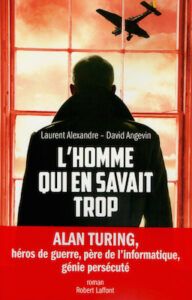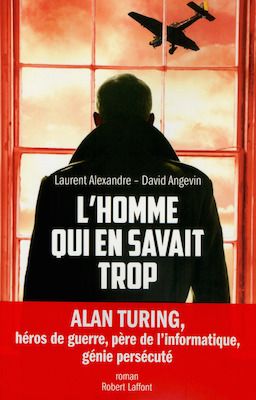The man who knew too much
As for many inventors, precursors, Alan Turing is distinguished by his character, his a-sociability. And when the inventor’s spirit crosses that of history, in this case that of the Second World War followed by that of the Cold War, it makes sparks fly. Laurent ALEXANDRE and David LANGEVIN skilfully tell us the short life of a key man, as much for his role in the deciphering of the German codes of the Enigma machine as for his role in the emergence of an instrument that is today at the center of our daily lives: the computer.
Summary
An unsung hero of the Second World War and a visionary genius – he invented the computer – Alan Turing revolutionized our lives. And he died a pariah.
In a near future. The transhumanists have won. AI (artificial intelligence) now dominates the world. But she has an obsession: to rehabilitate the memory of her “father”, the brilliant English mathematician Alan Turing.
To do this, he has to prove that he didn’t commit suicide, as the official version has always claimed, but that he was murdered. In search of the slightest clue, she goes back over her life…
By decoding Enigma, the encryption machine of the German forces, pride of the Hitler regime on which the Allied secret services were breaking their teeth, Alan Turing has greatly influenced the course of history. By creating the computer, he invented the future. However, this young homosexual with an exceptional IQ had a terrible fate: treated as a renegade by his own country, he died of cyanide poisoning under suspicious circumstances in 1954, in the middle of the Cold War, shortly after having accepted chemical castration to escape from prison. In the puritanical and ultraconservative post-war England, influenced by American McCarthyism, who had an interest in eliminating Turing, the man who knew too much ?
Between history, espionage, science and state secrets, a “biopic” conducted like a thriller where we meet Churchill, Eisenhower, Hitler, Truman, Stalin, the spies of Cambridge, de Gaulle, and until the disturbing shadow of John Edgar Hoover.
Criticism
 It is by the angle of the return to the sources that the life of;Alan Turing is approached. Through the direct descent of the Turing machine, a hyper-performing computer endowed with a real autonomous artificial intelligence wants to know everything about its progenitor by feeding itself with all the data available on him. By means of a virtual reality helmet, the designer of this machine, President of a Google more than ever imperialist, enters the flesh and brain of Turing to relive his journey.
It is by the angle of the return to the sources that the life of;Alan Turing is approached. Through the direct descent of the Turing machine, a hyper-performing computer endowed with a real autonomous artificial intelligence wants to know everything about its progenitor by feeding itself with all the data available on him. By means of a virtual reality helmet, the designer of this machine, President of a Google more than ever imperialist, enters the flesh and brain of Turing to relive his journey.
This staging, which a few years ago could have been compared to science fiction, works well. Through Sergey Brin, a Steve Jobs to the power of 10, we follow, or even we are, this English scientist, homosexual and disinterested, constantly struggling with all forms of obscurantism. Fortunately for him, the imperatives of real politik, namely the vital need for England to decrypt the German codes to stop the attacks against its fleet, will allow him to complete his machine.
But this real politik will turn against him after the war with the witch-hunt against communists and homosexuals led by the boss of the FBI, Hoover, which will rage across the Atlantic.
The man who knew too much does not separate the story of the man from its context, the latter being essential to understand his journey.
Only a few people will manage to understand Turing and accept him as he is: a few relatives, a few collaborators, a few politicians like Winston Churchill. But they will not manage to protect him enough against social pressure, the fears of the Russian and American secret services and against the anti-communist (although Turing was never a communist) and anti-gay hatred.
This book is not a biography. It can be read as it claims to be, that is to say, a novel whose outcome is not really known: suicide or execution. The few reservations that we can express concern the treatment of certain historical periods, treated a little too quickly, which can hinder the understanding of certain stages of Turing’s life.
Even for the non-geeks, the reader that I am would also have liked to learn a little more about how Turing proceeded to crack Enigma.
But this novel also retains its share of the unknown, which is the stuff of legends: a story of a bitten apple;
To be read by all, including the radical fundamentalists, the sectarians of all sides who will learn that they manipulate with delight by posting their hateful messages via Internet a machine which owes its creation to a homosexual.
THE MAN WHO KNEW TOO MUCH
Laurent ALEXANDRE and David LANGEVIN
Robert Laffont – 2015


